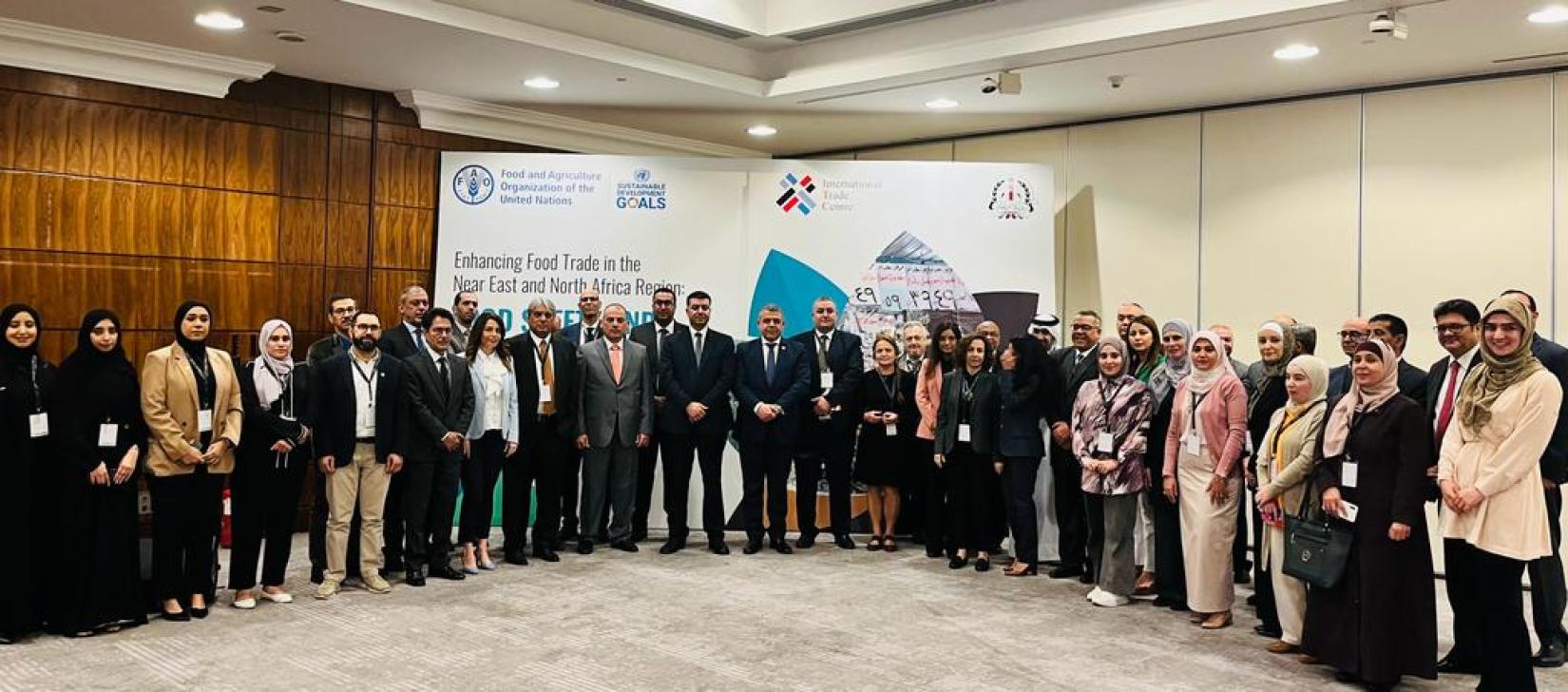FAO Regional training workshop aims at building regulatory capacity to align trade, food safety and quality measures in order to enhance intra-regional trade
08 May 2023

Amman - The Food and Agriculture Organization of the United Nations (FAO) is holding a regional workshop in Amman, Jordan on enhancing food trade in the Near East and North Africa Region: Food safety and trade facilitation over four days, from 8-11 May, in cooperation with the International Trade Center (ITC) and the Ministry of Agriculture of the Hashemite Kingdom of Jordan.
The workshop was inaugurated under the patronage of His Excellency Eng. Khalid Hnaifat, the Minister of Agriculture in Jordan with the presence of FAO Representative in Jordan, Eng. Nabil Assaf, and the Eng. Amjad Rashaideh, head of food directorate at the Jordan Food and Drug (JFDA). The workshop is attended by mid-senior level officials responsible for trade, food security and food safety related issues, from relevant ministries such as the trade, commerce, agriculture, health and/or authorities such as the customs and food safety
The workshop aims at improving the understanding of the government officials, national authorities and other relevant target groups of the science based standards (e.g. codex), transparency and traceability as well as harmonizing food safety processes and customs check. It will explore the trade-related aspects of food safety with agriculture, health and trade officials and experts examining the challenges and opportunities arising from rapid technological change and digitalization in food systems, in addition to new technologies which offer tools that can assist in managing food safety risks and help trade flow more smoothly. Furthermore, discussions will explore how to ensure low- and middle-income countries can use and benefit from these tools.
H.E Eng. Khalid Hnaifat, the Minister of Agriculture in Jordan, while inaugurating, stated that, “The Ministry of Agriculture in Jordan attaches the utmost attention to the issue of food safety with the aim of ensuring the circulation of safe and secure products for consumers. Various control methods are being applied in cooperation with all agencies and public and private sectors to ensure safe and high-quality products, which constitutes a solid barrier in the face of violating agricultural products. From access to internal or external markets.”
FAO Representative in Jordan, Eng. Nabil Assaf, confirmed that “Improving food safety is an essential element of improving food security, which exists when populations have access to sufficient and healthy food. At the same time, as food trade expands throughout the world, food safety has become a shared concern among both developed and developing countries.” He added “Governments in many countries have established new institutions, standards, and methods for regulating food safety and have increased investments in hazard control.”
The Head of Food Directorate at the JFDA, Eng. Amjad Rashaideh referred to the institution's relentless endeavor to advance in the field of control and to contribute to the safety and security of food through good planning of control programs and through investing in human resources with experience and competence in the field of food control, both local and imported.
FAO Senior Economist and Regional Head of Strategy and Policy, Mr. Ahmad Mukhtar, highlighted the importance of a roadmap and regional action plan to harmonize the regulatory standards, enhance cooperation and facilitate safe intra-regional trade. He pointed out the uniqueness of this Workshop by inviting variety of stakeholders, and particularly holding the Private Sector Roundtable.
Capacity Development is at the heart of FAO's mandate. In FAO’s view, Member Countries lead and manage their own development process, while FAO supports them in this endeavor by strengthening their capacities to achieve their own goals in food security, nutrition and agricultural development. FAO targets its capacity development support at individual, organization and policy level.
Food security is a major challenge in the Arab region. Agricultural production in Arab countries, which continues to be an important livelihood for many of the poorest, is failing to keep up with the demands for accessible and stable food supplies for the region’s burgeoning population. With the expanding populations are increasingly reliant on food imports through trade. Therefore, trade is critical for achieving food security in our region. For details, please have a look at https://www.fao.org/3/cc2302en/online/cc2302en.html
Many countries are looking to increased intra-regional trade as an opportunity for growth. Several regional economic communities (RECs) have developed or are developing various agreements to facilitate intra-regional trade in some cases with separate protocols to guide the regulation of animal health, plant health and food safety within the community.

